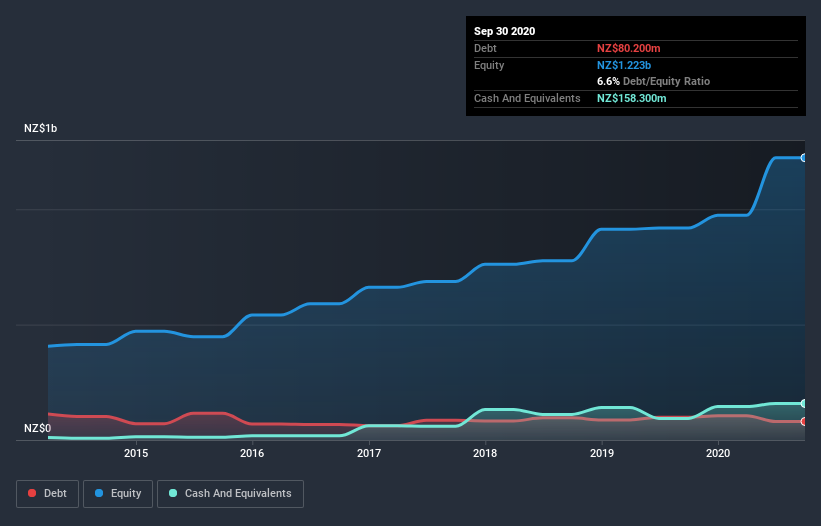Does Fisher & Paykel Healthcare (NZSE:FPH) Have A Healthy Balance Sheet?
Howard Marks put it nicely when he said that, rather than worrying about share price volatility, 'The possibility of permanent loss is the risk I worry about... and every practical investor I know worries about.' It's only natural to consider a company's balance sheet when you examine how risky it is, since debt is often involved when a business collapses. We can see that Fisher & Paykel Healthcare Corporation Limited (NZSE:FPH) does use debt in its business. But the real question is whether this debt is making the company risky.
Why Does Debt Bring Risk?
Generally speaking, debt only becomes a real problem when a company can't easily pay it off, either by raising capital or with its own cash flow. Part and parcel of capitalism is the process of 'creative destruction' where failed businesses are mercilessly liquidated by their bankers. While that is not too common, we often do see indebted companies permanently diluting shareholders because lenders force them to raise capital at a distressed price. Of course, debt can be an important tool in businesses, particularly capital heavy businesses. The first step when considering a company's debt levels is to consider its cash and debt together.
See our latest analysis for Fisher & Paykel Healthcare
What Is Fisher & Paykel Healthcare's Net Debt?
You can click the graphic below for the historical numbers, but it shows that Fisher & Paykel Healthcare had NZ$80.2m of debt in September 2020, down from NZ$98.8m, one year before. But it also has NZ$158.3m in cash to offset that, meaning it has NZ$78.1m net cash.
How Strong Is Fisher & Paykel Healthcare's Balance Sheet?
According to the last reported balance sheet, Fisher & Paykel Healthcare had liabilities of NZ$336.1m due within 12 months, and liabilities of NZ$72.5m due beyond 12 months. On the other hand, it had cash of NZ$158.3m and NZ$239.7m worth of receivables due within a year. So its liabilities total NZ$10.6m more than the combination of its cash and short-term receivables.
This state of affairs indicates that Fisher & Paykel Healthcare's balance sheet looks quite solid, as its total liabilities are just about equal to its liquid assets. So it's very unlikely that the NZ$18.6b company is short on cash, but still worth keeping an eye on the balance sheet. While it does have liabilities worth noting, Fisher & Paykel Healthcare also has more cash than debt, so we're pretty confident it can manage its debt safely.
On top of that, Fisher & Paykel Healthcare grew its EBIT by 56% over the last twelve months, and that growth will make it easier to handle its debt. There's no doubt that we learn most about debt from the balance sheet. But it is future earnings, more than anything, that will determine Fisher & Paykel Healthcare's ability to maintain a healthy balance sheet going forward. So if you're focused on the future you can check out this free report showing analyst profit forecasts.
Finally, while the tax-man may adore accounting profits, lenders only accept cold hard cash. Fisher & Paykel Healthcare may have net cash on the balance sheet, but it is still interesting to look at how well the business converts its earnings before interest and tax (EBIT) to free cash flow, because that will influence both its need for, and its capacity to manage debt. Looking at the most recent three years, Fisher & Paykel Healthcare recorded free cash flow of 44% of its EBIT, which is weaker than we'd expect. That's not great, when it comes to paying down debt.
Summing up
While it is always sensible to look at a company's total liabilities, it is very reassuring that Fisher & Paykel Healthcare has NZ$78.1m in net cash. And it impressed us with its EBIT growth of 56% over the last year. So is Fisher & Paykel Healthcare's debt a risk? It doesn't seem so to us. The balance sheet is clearly the area to focus on when you are analysing debt. However, not all investment risk resides within the balance sheet - far from it. For example - Fisher & Paykel Healthcare has 1 warning sign we think you should be aware of.
At the end of the day, it's often better to focus on companies that are free from net debt. You can access our special list of such companies (all with a track record of profit growth). It's free.
This article by Simply Wall St is general in nature. It does not constitute a recommendation to buy or sell any stock, and does not take account of your objectives, or your financial situation. We aim to bring you long-term focused analysis driven by fundamental data. Note that our analysis may not factor in the latest price-sensitive company announcements or qualitative material. Simply Wall St has no position in any stocks mentioned.
Have feedback on this article? Concerned about the content? Get in touch with us directly. Alternatively, email editorial-team (at) simplywallst.com.

 Yahoo Finance
Yahoo Finance 
